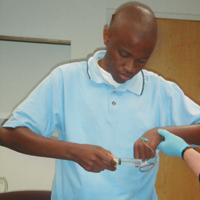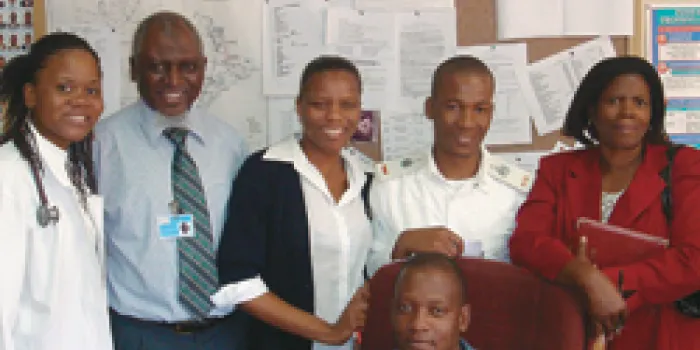Although your bleeding disorder may be well managed, that is not the case globally. There is a noticeable gap in treatment around the world, as most people with hemophilia or other bleeding disorders do not receive adequate diagnosis, treatment and management. The World Federation of Hemophilia (WFH) aims to close that gap with its Twinning Program. By partnering established organizations with emerging ones overseas, the goal is to help increase access to care for the estimated 75% of people with bleeding disorders globally who still receive inadequate treatment or no treatment.
US hemophilia treatment centers (HTCs) have been leaders in the WFH Treatment Center Twinning Program. Recently, more and more US chapters have signed on for the Hemophilia Organization Twinning Program, recognizing the mutual benefits to be gained. There are currently seven US HTC twins and three US Hemophilia Organization twins.
“Our WFH twinning experiences in Africa have been life-changing,” says Regina Butler, director, Region III Hemophilia Treatment Centers. She is nurse coordinator at the Hemostasis and Thrombosis Center at the Children’s Hospital of Philadelphia. “While our original intent in embarking on twinning partnerships in Botswana and Ghana was to help providers and patients in Africa recognize and treat individuals with bleeding disorders and for patients to have better care and outcomes, the results were so much more personal.
“It is remarkable to see how patients and providers are so creative, so committed, and so positive in approaching chronic illness in the midst of other significant challenges. This is without the resources that we so take for granted in North America.”

World Federation of Hemophilia
A patient in Botswana self-infuses.
Butler’s experiences highlight how the twinning partnership can help increase understanding within the US chapter communities of the great need to preserve the care that is already established and to work successfully with limited resources. The WFH Twinning Program has provided established hemophilia organizations with experiences for their communities that they would not normally have at home. This awareness has helped strengthen their own members’ commitment to protecting their own care.
The Arizona Hemophilia Association (AHA) joined the program this year. During its initial assessment visit to Skopje, Macedonia, AHA saw concrete examples of why its involvement was so important. “I was very moved by the stories these people told of their struggles with hemophilia,” says Jessica Steed, AHA board vice president. “There was so much raw emotion in the room as people talked about joint issues, childcare problems, and geographical problems with access to clotting factor.”
The new Twinning Organization Partnership between the national hemophilia organization of Kyrgyzstan and the Mary M. Gooley Hemophilia Center in Rochester, New York, was born out of the HTC twinning partnership between the HTC in Bishkek, the Kyrgyz capital, and the Rochester HTC. This partnership will mainly focus on establishing a registry and a board of directors in Kyrgyzstan to help empower patients and caregivers.
After several prior twinning partnerships that proved rewarding, Hemophilia of Georgia (HOG) is now partnering with the national hemophilia organization in Bolivia. HOG’s experiences with the WFH Twinning Program started in 1999 when it partnered with the national hemophilia organization in Chile. That was followed by a partnership with Honduras in 2004. HOG’s current twinning project will focus on developing a registry, training the board of directors in areas such as fundraising and leadership, plus coaching on medical relations and lobbying.
The WFH hopes to continue to expand the program through increased NHF chapter participation. The next group of twins will be approved in October 2012.
“Our lives have been forever touched by the pain, the courage, the determination and the joy of the people we have met in Africa,” says Butler.
But pain is not inevitable; it’s conquerable. “The World Federation of Hemophilia envisions a day when treatment will be available for all children around the world. Twinning is an important part of making this vision become reality,” says Mark Skinner, WFH president.

